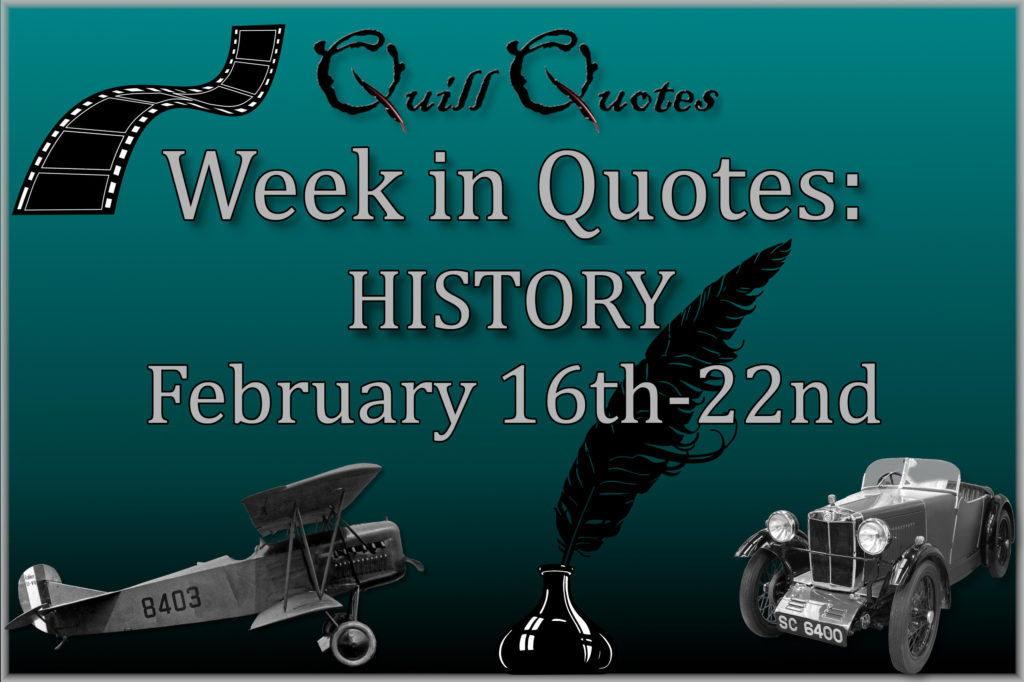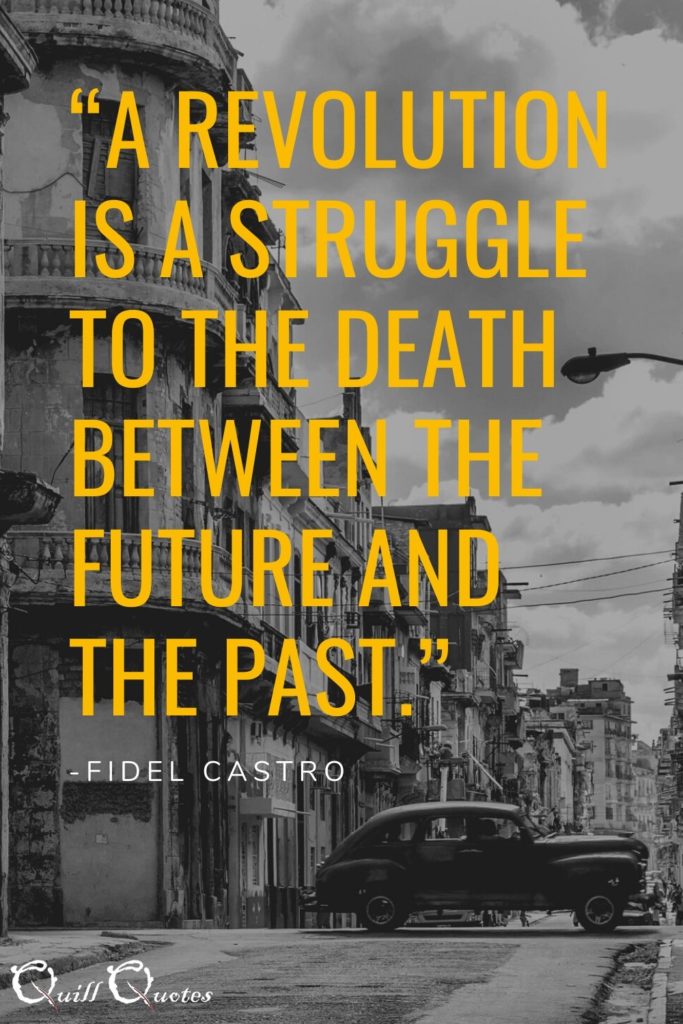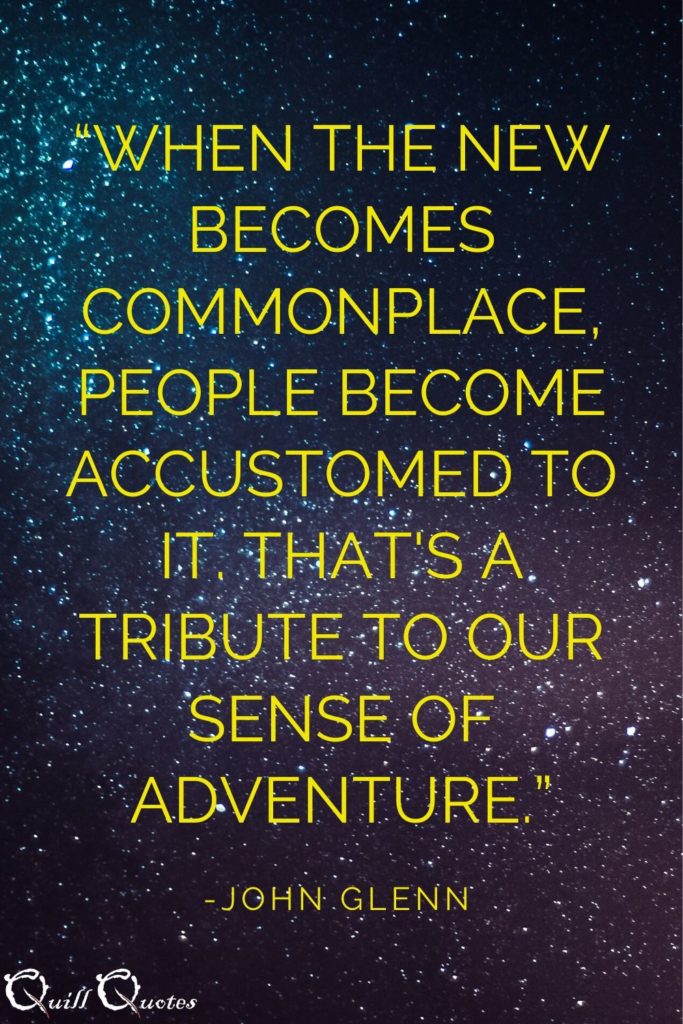There is always much to learn from quotes and their historical significance. Read on for a collection of quotes and general history from February 16th – 22nd.

February 16, 1959
“Condemn me. It does not matter. History will absolve me.”
– Fidel Castro
After leading a revolution, Fidel Castro became the Prime Minister of Cuba on February 16, 1959. Although he had repeatedly denied being a communist, he converted Cuba into a one-party, socialist state under Communist Party rule once in power. He ruled for nearly 50 years, changing his title to President of the Council of State and Council of Ministers in 1976, delegating duties during medical leave in 2006, and finally leaving office in 2008. As the longest-serving non-royal head of state in the 20th and 21st centuries, Castro became a polarizing figure throughout the world.

February 17, 1864
“I must confess that my imagination refuses to see any sort of submarine doing anything but suffocating its crew and floundering at sea.”
– H. G. Wells
The H. L. Hunley became the first combat submarine to sink a warship on February 17, 1864, during the American Civil War. Named for her inventor, Horace Lawson Hunley, the submarine was used by the Confederate States Army in two test missions and the successful sinking of the USS Housatonic. Despite the success, Hunley sank on all three missions causing the deaths of 21 crewmen. Hunley was raised and returned to service after both test missions but was not found until 1995 following the attack on Housatonic. In 2000, Hunley was raised a third time and is now on display at the Warren Lasch Conservation Center in North Charleston, South Carolina.
February 18, 1901
“I invite the House to consider which form of government—civil government or military government—is most likely to be conducive to the restoration of the banished prosperity of the country and most likely to encourage the return of the population now scattered far and wide. I understand that there are hon. Members who are in hopes that representative institutions may directly follow military government, but I think they cannot realise thoroughly how very irksome such military government is.”
– Winston Churchill
On February 18, 1901, Winston Churchill gave his maiden speech in the House of Commons regarding the ongoing Boer War in South Africa. His speech was well received and Churchill went on to lead a long career in politics. Most notably, he led the United Kingdom as Prime Minister through much of World War II. He also served a lesser-known second term as Prime Minister from 1951 to 1955, in which he focused on foreign affairs during the Cold War. While some of his decisions remain controversial, Churchill is widely regarded as one of the 20th century’s most significant leaders.
February 19, 1910
“I never had typhoid in my life and have always been healthy. Why should I be banished like a leper and compelled to live in solitary confinement with only a dog for a companion?”
– Mary Mallon
Mary Mallon, better known as Typhoid Mary, was released from quarantine on February 19, 1910, after promising never to work as a cook again. She had spent 3 years in quarantine after being identified as the first asymptomatic carrier of typhoid fever in the United States and having caused outbreaks in numerous wealthy families she cooked for. Unfortunately, she could make more money as a cook and returned to the profession after several years as a laundress. Following another major outbreak in 1915, she was returned to quarantine where she spent the remaining 23 years of her life. Throughout her career as a cook, Mallon infected at least 51 people, causing 3 deaths. “Typhoid Mary” has since become a colloquial term for someone who spreads disease or some other undesirable thing.
February 20, 1962
“I don’t know what you could say about a day in which you have seen four beautiful sunsets.”
– John Glenn
John Glenn became the first American to orbit the Earth on February 20, 1962. As part of NASA’s Project Mercury, it was the fifth human spaceflight in history, after the Soviet orbital flights Vostok 1 and 2 and American sub-orbital flights Mercury-Redstone 3 and 4. Glenn and his Mercury spacecraft, Friendship 7, made three orbits in just under 5 hours before splashing down safely in the Atlantic Ocean.

February 21, 1972
“The week that changed the world.”
– Richard Nixon
On February 21, 1972, U.S. President Richard Nixon began his historic seven-day visit to the People’s Republic of China. The visit ended 25 years of no diplomatic ties between the two nations. While a key step in establishing stable relations with China, the main purpose was to gain more leverage over relations with the Soviet Union. The visit was considered a huge success, sparking every successive U.S. president, except Jimmy Carter, to make a visit to China. The trip also gave rise to the saying “a Nixon to China moment” for any big, unexpected action by a politician.
February 22, 1980
“11 seconds, you’ve got 10 seconds, the countdown going on right now! Morrow, up to Silk. Five seconds left in the game. Do you believe in miracles? YES!”
– Al Michaels
On February 22, 1980, the United States defeated the four-time defending gold medalist Soviet Union ice hockey team at the Winter Olympics, becoming known as the “Miracle on Ice”. Although the United States was hosting the Olympics in Lake Placid, New York, the Soviet Union was heavily favored to win gold. However, the young American team coached by Herb Brooks had other plans. Trailing 3-2 after the second period, the U.S. scored twice in the third to take a 4-3 victory! The victory and Al Michaels’ call of the final seconds became one of the most iconic moments in sports. Both the U.S. and the Soviet Union went on to win their final games, finishing gold and silver respectively.
In case you missed last week’s quotes, see History February 9th – 15th.
To never miss a Quill Quotes post, please subscribe via email and/or follow us on social media!
Leave a Reply